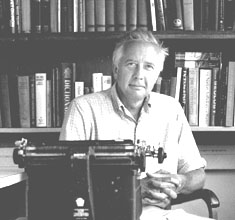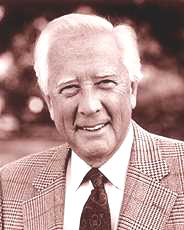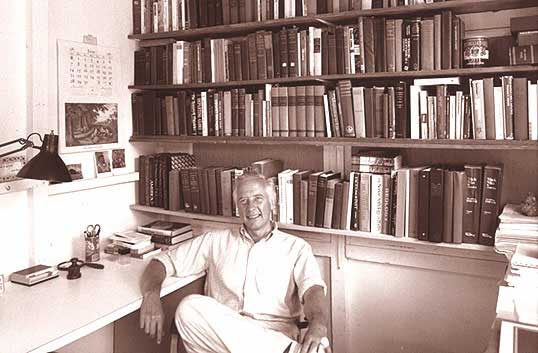DAVID McCULLOUGH looks the
part and is the embodiment of a successful writer. He lives comfortably
on Martha's Vineyard with his attractive wife, Rosalee, whom
he described in a Commencement Address at Hamilton College just
two years ago as: "The most important person in my life,
my editor-in-chief, my brain trust, my mission control, my first
wife, my present wife..."
He is tall, trim, and charming.
In a tattersall-checked shirt and faded chinos he's more believable
in the role than all the actors who have played the part. Probably
because the writer in this case is real and, as so, unpretentious.
David McCullough is twice a winner of the National Book Award
and of the prestigious Francis Parkman Prize. For his monumental
Truman he  received the Pulitzer
Prize.
received the Pulitzer
Prize.
I spent five hours in the genial
and hospitable company of David and Rosalee McCullough. The interview
produced the proverbial surfeit of riches -- so many profoundly
illuminating observations that they need no exposition. That
which follows is David McCullough, verbatim.
I WORKED FOR TIME-LIFE and then went
to Washington during the Kennedy administration to work for the
USIA when Ed Murrow was at its head. Then I came back to New
York and worked as an editor and writer at American Heritage
for six years. And I was writing, nights and weekends, a book
which turned out to be The Johnstown Flood, which had a wonderful
reception, much more than we expected. It gave me a grub stake
to cut away and try writing full time.
Rosalee and I sold our house in White
Plains and got out, trying to cut costs. We moved first to Middlebury,
Vermont, and loved it. But I found I was really out of touch
up there. This surprises some people who say, "How out of
touch can you be now, living on an island?" What they don't
realize is that I can be in my publisher's office as quickly
as it once took me to get from Wilton, Connecticut, where I was
living and commuting -- by taking the morning flight right out
of the airport, five minutes from here! I actually get to New
York a little too early: they don't open up down there until
9:30 or 10 o'clock, and I have to get a cup of coffee somewhere
and wait for the business day to begin.
Also, there's such a constant flow of
people coming to the Island, not just in the summertime, either,
but on weekends...people who are in work that represents a world
beyond these shores...people who are fun to talk to and who are
stimulating...who keep the brain from turning into a pudding.
We don't see people, except on weekends;
I'm working most of the time. I work very hard. We've made wonderful
friends who don't live on Martha's Vineyard but who come here
in the summer or on weekends. And we've made terrific friends
who live here year-round. The diversity of backgrounds and places
of origin, even in a little town like West Tisbury is extraordinary.
Right up and down this street, the professions that are represented
by retired people, the avocations represented by people doing
independent work of different kinds, is really remarkable.
One of the wildest misconceptions is
that writing is a solitary pursuit. Nonsense. It really isn't!
You have to go see people to do your research; you get to interview
people. You get to meet people who are working at your publishing
house. In my kind of writing, one subject may be engineering,
the next subject may be politics. You get to know all about different
professions, meeting those kinds of people. Not it is not solitary.
Another misconception is that writing
is somehow easy. The hardest thing of all is to make it look
easy. It's like anything else -- a great batter, a great tennis
player -- they make it look easy, but it isn't. The other thing
is that I don't think there's any such thing as a Muse, for example.
It's going out there every day and doing it. That's what it is.
It's working.
When I'm in my studio I wouldn't rather
be anywhere else in the world. The idea that I can make a living
doing what I'd rather do than anything else, is, to me, just
a miracle. It's a gift that every day I can do that. And when
I think of the unpleasant or seemingly pointless days that other
people spend in their lines of work, I realize how blessed I
am. I have terrific support in Rosalee. I would rather go out
there and work on a book I really want to write than anything
I know.
All of my books are derived out of a
great ignorance. I've never known much about any subject that
I started. When I started it, I didn't know anything about the
Panama Canal. I didn't know anything about the Brooklyn Bridge.
I didn't know anything much about Theodore Roosevelt...certainly
I knew nothing about asthma, absolutely nothing about his mother
and father. And, as I said earlier, if I had known, I don't think
I would have wanted to write the book. It's the discovery; it's
getting on the track; it's the accelerative quality of curiosity.
It's like gravity -- it accelerates...the more you find out,
the more you want to find out, and that's a great time...boy,
it's wonderful!
The real fun of what I do is in doing
it. The reviews are gratifying and sometimes thrilling, the awards,
the wonderful letters from readers...all that is terrific. I
dearly love it and need it, but the real fun is in going out
there and doing it. My favorite book is always the book I'm working
on.
1981
I'm a pretty fast typist. I work on
the typewriter. I compose on the typewriter and that comes from
having worked on magazines. I rewrite. If I can produce two typewritten
pages that I'm satisfied with in a morning, then I'm moving along
just fine. Four in a day. I'm out there all day. In my work it
isn't all writing. I'm reading. I'm checking notes. Mulling.
I do a lot of mulling. Looking up quotations or facts or whatever...it's
not just writing. When I'm really working full out, four good
pages a day is what I aim for.
I rewrite as I go along. I don't write
a first draft, so called, and then rewrite the whole book. I
could never do that. I'm building as I go along. So when the
chapter is finished -- except for later on when I might come
back and edit when it's been retyped -- I feel that's it.
I work from an outline, but I keep revising
it as I go along. I've never gone to a publisher with an outline.
My outline is strictly for me. It's a guide, mainly to show where
you begin and where you end and sort of how it's going to be.
But it's always changing, mainly because it picks up a life of
its own. And you change as you go along. Take a book of my kind,
on which you're spending four years. Well, four years later,
you're not the same person you were four years before. And, more
obviously, your knowledge of the subject has become much deeper:
there's more range and sensitivity to what your mind is able
to grasp in all this. So that, very often, I've had the experience
that when I'm nearing the end of the book, I realize that the
first part -- that I wrote in the beginning -- is not quite the
same tone of voice.
The real insights start to happen for
me after I'm well into it because you begin to make connections
which you didn't make before. You begin to see what you didn't
see then. Conrad said, "Writing is seeing." He was
right. It is. My great feeling is that you have to see a subject
in context. If I have an operational word it's context. I try
to see the story in the context of a lot of things that other
writers on the subject have not bothered with.
A subject like the Panama Canal, let's
say. My effort there was to see that event, that achievement,
in the context of politics, of history, of medicine, the geology
of Central America, the advent of certain technology in the late
nineteenth century which was changing what could be accomplished,
what could be proposed...to see it in the context of our North
American view of Latin America -- all those. Finance -- a French
company went broke; it was the biggest financial collapse in
the history of the world up to that point. So that meant that
I had to know an awful lot about how that came about and why
that was. That same story unleashed the first serious outbreak
of anti-Semitism in France. So I had to understand what that
was all about. It eventually let to the Dreyfus affair.
In the Roosevelt book, I've tried to
see that individual, not just in the context of his family who
were the closest to him and most important to him, but also to
see the family in the context of a particular social class in
which they were prominent. And, then, to see that social class
in the context of New York City, circa 1970 to 1885, 1886, and
so forth. To see their income in the context of the times, for
example. Not to look at those dollar figures that people quote
and say, "That's what it was." You have to ask "What
does it mean in scale?"
I think the training that I had, the
experience I had in drawing and pa inting
has helped me enormously in this work. Because one thing you
do learn about is scale. And proportions. To see events and facts,
if you will, or personalities, in proportion. Teddy Roosevelt
says, "My inheritance meant that I would have an income
of $8,000 a year. That made me comfortable, but not rich."
Every biographer who has ever written about Roosevelt has taken
that statement and just played it back at face value. So I thought,
"Well, what did that mean in his time?" And I found
that what it meant, and it's an astonishing thing to discover,
is that his income was more than that of the president of Harvard,
who earned $5,000.
inting
has helped me enormously in this work. Because one thing you
do learn about is scale. And proportions. To see events and facts,
if you will, or personalities, in proportion. Teddy Roosevelt
says, "My inheritance meant that I would have an income
of $8,000 a year. That made me comfortable, but not rich."
Every biographer who has ever written about Roosevelt has taken
that statement and just played it back at face value. So I thought,
"Well, what did that mean in his time?" And I found
that what it meant, and it's an astonishing thing to discover,
is that his income was more than that of the president of Harvard,
who earned $5,000.
History is the story of people. The
events are the people...unless it's a natural event. Krakatoa
goes off. That really has nothing to do with people except that
it has a lot to do with how people responded to it, how they
felt about it, who got killed, and so forth. Very few professional
historians are, at heart, interested in people. And that's one
of the reasons that so much that is written in the way of history,
and in the teaching of history, is boring. I can't tell you how
many people have come up to me and said, "Oh, if history
had only been taught like that when I was in school, I would
have become a history major."
Well, there isn't any other way to do
it, in my view. That's what history is, and the crucial thing
is to feel, not just to know, but to feel that people of the
past were just as real, just as alive, just as prey to the same
emotions, fears, exhilarations -- whatever -- that we are. And
the only thing that is different is their time was different
from our time, but they didn't think they were living in The
Past.
I want to make a point. I use photography
as a bibliographic source. I study old nineteenth century photos
in order to learn about the past. One of the reasons we feel
people in the old days weren't quite human -- or certainly were
very different from us -- that they weren't bathed in the same
light we're bathed in, that there wasn't air around them the
way there is air around us -- is that they see those old photographs
taken with a certain type of camera which gave that precise clarity,
and you have those people with those somber looks, stiff, and
so forth. If you look at enough of those pictures, you begin
to think those people weren't alive, the way we are alive. The
great antidote, the great cure for that feeling is to go and
look at something like the Pisarro show in Boston and see that
it's a nineteenth century man painting life, painting light,
air, the sense that we're creatures in space...it's the same
as we are now. And I think that maybe the artist may turn out
to be the great historian.
To think that photography is reality
is one of the great hoaxes of our time. Very often, photography
is more of an abstraction than painting. Far more. Those nineteenth
century black-and-white photographs are far more removed from
reality than the paintings of the nineteenth century masters.
I kept a large book of paintings by American impressionists on
my shelf while I was writing the Roosevelt book, and I would
take out that book every so often and just page through to look
at those pictures, just to remind myself of the reality of the
time and of the people. We're all the same. And, of course, one
of the joys of my work is to bring people to life and to make
the reader feel what it was like to have been alive then, to
have part of that.
If you want the facts on some aspect
of history -- whether it is Roosevelt, or whatever -- you can
get that in an encyclopedia. That's not why I write books. I
want you to feel it, to sense the story. I really don't think
of myself as a historian. I don't call myself a historian. I'm
a writer whose milieu, if you will, is the past. And the past,
you know, can be an hour ago.
 Photographer unknown, 1998
Photographer unknown, 1998
David McCullough's books include
The Johnstown Flood, The Great Bridge, The Path Between the Seas,
Mornings on Horseback, Brave Companions, and Truman. None of
his books has ever been out of print. In a crowded, productive
career, David McCullough has been an editor, essayist, teacher,
lecturer, and familiar presence on public television, as host
of "The American Experience" and narrator of numerous
documentaries such as "The Civil War." He is president
of the Society of American Historians [though in this earlier
interview he refused to call himself a historian]. He holds twenty-two
honorary degrees and has been elected to the American Academy
of Arts and Sciences. A gifted speaker, he has lectured in all
parts of the country and abroad, as well as at the White House,
as part of the White House presidential lecture series. He is
also one of the few private citizens to be asked to speak before
a joint session of Congress. David McCullough was born in Pittsburgh,
Pennsylvania, in 1933. He was educated there and at Yale, where
he graduated with honors in English literature. He is an avid
reader, traveler, landscape painter, and Sunday night spaghetti
chef. He lives in West Tisbury with his wife Rosalee Barnes McCullough.
They have five children and twelve grandchildren. He is currently
at work on a book about the intertwining lives of John and Abigail
Adams and Thomas Jefferson. Critic John Leonard, writing in The
New York Times, said that David McCullough was incapable of writing
a page of bad prose and that "we have no better social historian."

 received the Pulitzer
Prize.
received the Pulitzer
Prize.
 inting
has helped me enormously in this work. Because one thing you
do learn about is scale. And proportions. To see events and facts,
if you will, or personalities, in proportion. Teddy Roosevelt
says, "My inheritance meant that I would have an income
of $8,000 a year. That made me comfortable, but not rich."
Every biographer who has ever written about Roosevelt has taken
that statement and just played it back at face value. So I thought,
"Well, what did that mean in his time?" And I found
that what it meant, and it's an astonishing thing to discover,
is that his income was more than that of the president of Harvard,
who earned $5,000.
inting
has helped me enormously in this work. Because one thing you
do learn about is scale. And proportions. To see events and facts,
if you will, or personalities, in proportion. Teddy Roosevelt
says, "My inheritance meant that I would have an income
of $8,000 a year. That made me comfortable, but not rich."
Every biographer who has ever written about Roosevelt has taken
that statement and just played it back at face value. So I thought,
"Well, what did that mean in his time?" And I found
that what it meant, and it's an astonishing thing to discover,
is that his income was more than that of the president of Harvard,
who earned $5,000. Photographer unknown, 1998
Photographer unknown, 1998